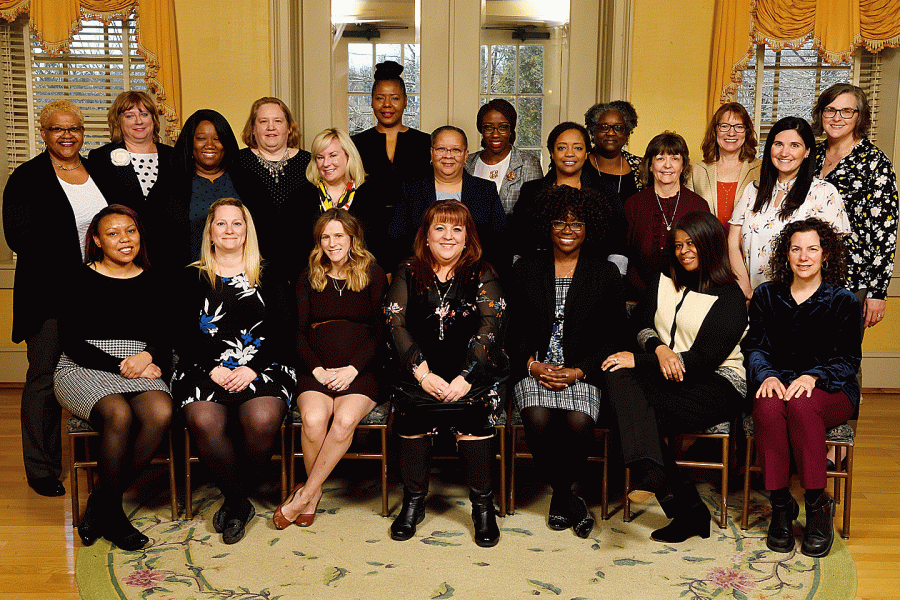When it came to career advancement, Donna Sims says she was "my own worst enemy."
A Johns Hopkins employee since 1983 in a variety of assistant positions—beginning as a temp secretary in Geriatric Medicine and Gerontology—Sims stood by as many of her peers moved on to better jobs. And then wondered why she wasn't doing the same.
"I'd become stagnant and only looked for something else [at Hopkins] if something upset me where I was," says Sims, currently executive assistant to Ellen MacKenzie, dean of the Bloomberg School of Public Health. Those moves, she says, were usually lateral.
But when JHU launched a pilot program last year to develop talent already at the university, someone who knew what Sims was capable of nominated her for the inaugural course. Eligible were current employees throughout the university already working as administrative assistants.
Those selected had to have been at JHU for at least a year, have consistent above-average to excellent performance evaluations, and be deemed to possess a high degree of potential.
"This was brought to us from various university offices asking us to focus on developing the talent we already have and elevate them," says Ann Shiu, who specializes in learning solutions and talent management in Human Resources. "People have talents they don't always realize."
Shiu developed the program—known as the Administrative Development Program—with colleague Siyade Gemechisa, a senior instructional designer. In all, 20 people—a dozen participants and eight mentors—took part in the inaugural ADP cohort. All were female, and more than half identified as representing a racial or ethnic minority.
Seven sessions, with titles such as the Ultimate Professional, Relationship Awareness Theory, and A Day in the Life, were held on various university campus locations.
"Keeping it in the Hopkins family is a good way to look at it," says Gemechisa of the six-month program, noting that it was composed of course work—including podcasts recorded by veterans in high-level support roles—mentorship, and application. "This was designed for those who will support top people in the university."
Lisa Moreland, a 19-year veteran of various administrative support roles at JHU, was a mentor in the ADP program. "The role of administration is essential to the university," she says. "Administrators are the backbone, the glue, and the gatekeepers, and their contributions are often overlooked."
Helping a colleague into a role supporting crucial players across the university, Moreland says, "was an opportunity for me to 'pay it forward,' to be kind, and share what has been shared with me through the years."
Noting that the experience helped her identify some of her own shortcomings, Moreland says she is "better for having participated" and that she "appreciates the new relationship I have with my mentee."
Indeed, the title "administrative assistant" does not do justice to the range of duties that graduates of the program—which ran from mid-October of 2018 to late March this year—will be expected to excel at as they progress in their careers.
Three of the 12 who completed the program, including Sims, have already applied for openings that come with higher responsibilities and more pay.
"When I read my job description and my mentor's job description, I realized we were both doing the same thing," Sims says. Yet, she had never made an effort to see if the grass might be greener in other departments.
The Hopkins landscape, says Sims, a graduate of Dunbar High School and what was then Villa Julie junior college (now Stevenson University), can be intimidating for someone without a higher degree.
"I was afraid to take the leap, didn't think I was good enough," Sims says. "I figured I'd just stay in my comfortable box."
The challenge of working for people at the highest university levels can often be anything but comfortable, with a range of unexpected situations.
"A lot of the work is dealing with the nuance of personalities," Gemechisa says. "There are unspoken things, situations that come up, where you need to think on your feet." She notes that the mentoring facet of the program was crucial because it "mirrored the relationships" the cohorts will have with bosses in the future. In addition, she says, participants acknowledged that through the program they began to view their abilities, contributions, and worth differently, and this gave them more confidence.
"You can teach technique and basic concepts," she says, "but the real test is when you take it out of the classroom and try it out."
Which Donna Sims says she is very much looking forward to—so much so that when she settles into her next position, she hopes to become a mentor in a future ADP course to someone like herself.
She will certainly know what she's talking about.
Posted in News+Info
Tagged advancing your career








